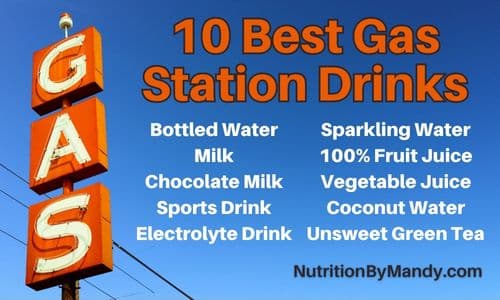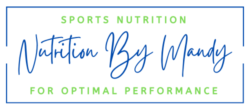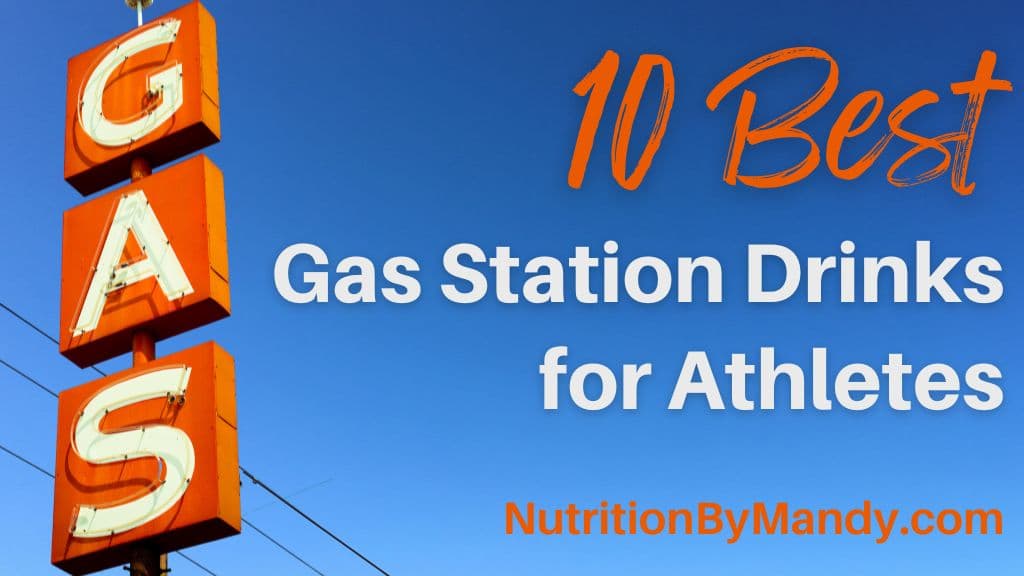10 Best Gas Station Drinks for Athletes
Ever wonder what the best gas station drink options for athletes are? With so many choices available it can be hard to determine which beverage will help you meet your hydration needs. Let’s look at 10 gas station drink options that athletes can enjoy when on the road.
#1 Gas Station Drink for Athletes: Bottled Water
It is not surprising that water is first on the list of best gas station drinks for athletes. Maintaining optimal hydration is important for an athlete’s health and performance. Dehydration increases the risk of heat illness, especially when exercising in a hot and humid environment. In addition, even mild dehydration can negatively impact aerobic sports performance and cognitive function (1).
Given this, athletes do not want to start a practice or competition in a dehydrated state. Grabbing a bottle of water to enjoy in the car or on the bus is a great way to help meet your hydration needs. For additional information on hydration needs during your event, check-out my recent blog: Your Guide to Game Day Nutrition.
#2 Milk
Milk is another healthy gas station drink option for athletes. Milk provides 13 essential nutrients, including 8 grams of complete protein per cup. Milk contains calcium and Vitamin D for strong bones, along with B Vitamins, Vitamin A, and phosphorus making it a nutrient-rich choice for athletes to grab at the gas station.
Consider pairing milk with healthy gas station snacks, such as granola bars, fig bars, or dry cereal, for a quick, nutritious snack or breakfast-on-the-go.

#3 Chocolate Milk
If you stop by the gas station after a practice or competition, chocolate milk can be a good choice to help you meet your recovery nutrition needs. During the recovery period, athletes need to replace carbohydrates, fluid, and electrolytes used during the exercise session. In addition, athletes should consume protein to build and repair muscles.
Chocolate milk is 90% water, which can help athletes rehydrate following activity. In addition, chocolate milk contains the same protein, vitamin, and mineral content of regular milk with added carbohydrates. Thus, chocolate milk checks all the boxes when it comes to recovery nutrition and is a great post-workout drink choice at the gas station.
#4 Sports Drinks
If you stop at the gas station on the way to a sports practice or competition, grabbing a sports drink is a good choice. Sports drinks are formulated to contain carbohydrates, sodium, and a small amount of potassium. When consumed during activity, the carbohydrates in the sports drink provide energy for the working muscles. The sodium and potassium in the sports drink helps replace electrolytes lost in sweat. The sodium in the sports drink also helps stimulate thirst (1), thus encouraging you to drink.
If you will be competing in high-intensity exercise lasting over an hour, a sports drinks can help you meet your carbohydrate needs and replace electrolytes lost. Sports drinks can also be beneficial if you will be competing in a less intense, longer duration event (1).
When selecting a sports drink, it is important to recognize that not all sports drinks contain the same concentration of carbohydrates, sodium, and potassium. When looking for a sports drink to consume during activity, check for the following (1):
- Carbohydrate concentration: 6-8% (14-19 g carbohydrate/8 oz)
- Sodium concentration: 20–30 meq per L (~110-165 mg sodium/8 oz)
- Potassium concentration: ~2–5 meq per L (~20-50 mg potassium/8 oz)
Review the nutrition facts label of the sports drink you are considering to see if it contains the nutrients you need in the correct amounts for competition.
Individual Packets of Sports Drink Mix
Consider keeping individual packets of sports drink mix with you in your car and gym bag. You can easily purchase a bottle of water to add the sports drink mix into, thus making your own sports drink as you travel.

#5 Electrolyte Drinks and Reduced or Zero Sugar Sports Drinks
If you are planning for a relaxing day outdoors, such as a day on the lake or at the beach, an electrolyte drink or a reduced/zero sugar sports drink is a great gas station option.
The reduced/zero sugar sports drinks often provide similar amounts of electrolytes as regular sports drinks with less (or no) carbohydrates. However, make sure to read the nutrition facts label closely on the beverages, as electrolyte contents may vary widely between drinks.
If you will be spending a day out in the sun and sweating, the reduced/zero sugar sports drinks can help you with replacing electrolytes that are lost in sweat. The sodium will also help stimulate thirst (1), thus encouraging you to drink and stay hydrated. In addition, the added flavor of the beverage may make drinking more appealing and help athletes stay on top of their hydration goals throughout the day.
#6 Sparkling Water
Sparkling water can help athletes meet their fluid needs outside of training and competition. Typically, sparkling water is made by adding carbon dioxide to water, which gives it a fizz. You would not want to consume a sparkling or carbonated beverage during competition, as the carbonation may make you feel bloated or bother your stomach during activity.
Some sparkling waters are made with natural mineral waters and other have minerals added into the drink. Many brands of sparking waters come in a variety of flavors, such as lemon, lime, and grapefruit. When selecting a sparkling water at the gas station, make sure to select a version that has no added sugars.
#7 100% Fruit Juice
Selecting 100% fruit juice at the gas station can be a tasty, nutritious drink for athletes. Fruit juices contain a variety of vitamins, minerals, and antioxidants, with different types of juice providing different nutrients. Aside from orange juice and apple juice, many gas stations offer other varieties of fruit juices you can enjoy, including pineapple, pomegranate, grape, and cranberry juice.
When selecting a fruit juice make sure the label indicates it is 100% fruit juice. Some fruit flavored beverages may be marketed as containing fruit juice, but the amount in the product may be minimal.
Keep in mind that fruit juice is not a good option to consume during activity. The carbohydrate content of fruit juice is much higher than the 6-8% concentration recommended for during activity. However, outside of activity, 100% fruit juice can help athletes to stay hydrated, as well as boost their nutrient intake.
#8 Vegetable Juice

Vegetable juice, such as V8® Vegetable Juice, is another nutritious option. A ½ cup glass of vegetable juice is considered a serving of vegetables. Vegetable juices are rich in vitamins and minerals, but lack the fiber you would get from eating vegetables. In general, vegetable juices are high in sodium. For example, an 8 fl oz serving of V8® Vegetable Juice contains 640 mg of sodium.
For athletes, incorporating vegetable juice into their sports nutrition meal plan can be a healthy option. Enjoying a glass of vegetable juice with a post-workout meal can be advantageous. The higher sodium content can help replace sweat losses. In addition, consuming sodium after exercise can help stimulate thirst and aid the body in retaining the fluid you drink (1).
#9 Coconut Water
Coconut water is another option for athletes to purchase from the gas station to help meet their hydration needs. Coconut water has a high potassium content, with one cup containing 404 mg of potassium (2). For comparison, one cup of a sports drink contains ~20-50 mg of potassium (depending on the brand).
Similar to sparkling water and 100% fruit juice, coconut water is not an ideal drink to consume during exercise. Compared to the sports drinks mentioned previously, coconut water is lower in both sodium (~64 mg/cup) and carbohydrate (~10 g/cup) content (2).
Although potassium is an important nutrient, with many important roles in the body, the main electrolyte the body loses in sweat is sodium. Therefore, during exercise you would want to choose a beverage containing a higher sodium concentration, as well as carbohydrates to provide energy for the working muscles.
If athletes like the flavor and want to drink coconut water outside of activity, it can assist with meeting overall hydration needs. When selecting a coconut water, make sure to look for an unsweetened variety. There are sugar-sweetened versions of coconut water on the market that contain quite a bit of added sugar.
#10 Unsweet Green Tea
Unsweet green tea is another drink option that athletes can enjoy at gas stations. Green tea contains polyphenols, which are known for their anti-inflammatory and antioxidant properties in the body (3). It is important to note that green tea does contain caffeine, but in lesser quantities than black tea or brewed coffee (4).
Although the concentration of polyphenols and caffeine may vary by brand, choosing an unsweet green tea can be a good choice to help athletes with staying hydrated. Similar to coconut water, when purchasing bottled green tea, make sure to select one without added sugar or other sweeteners.
If you are interested in a hot beverage, make sure to check the coffee area to see if green tea bags are available. A cup of hot green tea can be a great beverage option for athletes on a cold day.

What About Energy Drinks at the Gas Station?
Most gas stations have a wide variety of energy dinks available for sale. The drinks may range in size from large, 16 oz cans, to small shots that are <2 oz. Energy drinks are marketed with the claims of having a unique “energy blend” to help increase alertness, focus, and boost energy levels.
What’s in an Energy Drink?
Energy drinks contain caffeine along with a proprietary blend of ingredients claiming to increase energy levels. These energy blends may include ingredients such as: taurine, B Vitamins, guarana, green tea extract, L-carnitine, ginseng, ginger root, and chromium. The combination of ingredients in the drink may have a synergistic effect in the body and lead to health concerns.
For this reason, athletes should use caution with energy drinks. If you feel you are lacking energy, consider eating a carbohydrate-rich snack, such as a granola bar or fruit. Carbohydrates provide athletes with the energy needed to perform at their best. In addition, make sure you are getting enough sleep each night to allow your body time to rest and recover.

Gas Station Drinks for Athletes
You are now equipped with a variety of gas station drink options for athletes. Depending upon your activity plans for the day, you can determine which beverage will help you best meet your hydration needs. For additional travel snack ideas, check-out my recent blog: 9 Best Airplane Snacks for Athletes.
Join the Nutrition By Mandy Email List & Get a Free Athlete’s Grocery List
Click HERE to join the Nutrition By Mandy e-mail list. When you join you will receive a free athlete’s grocery list to print and take with you to the store.
About the Author
Mandy is a Sports Dietitian Nutritionist in the San Antonio, TX area. She is a Registered and Licensed Dietitian, a Board-Certified Specialist in Sports Dietetics, a Licensed Athletic Trainer, and is a Certified Exercise Physiologist through the American College of Sports Medicine. Mandy has experience working with athletes at the high school, collegiate, and professional levels. She believes the key to reaching one’s full potential, both in everyday life and in sports performance, relies on a healthy nutritional foundation. Learn more about the work Mandy does here.

